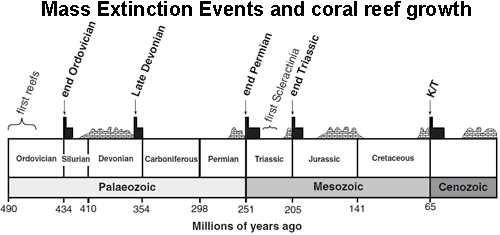Earth's five mass extinction events
Posted on 15 April 2010 by John Cook
As climate changes, a major question is whether nature can adapt to the changing conditions? The answer lies in the past. Throughout Earth's history, there have been periods where climate changed dramatically. The response was mass extinction events, when many species went extinct followed by a very slow recovery. The history of coral reefs gives us an insight into the nature of these events as reefs are so enduring and the fossil record of corals is relatively well known (Veron 2008). What we find is reefs were particularly impacted in mass extinctions, taking many millions of years to recover. These intervals are known as "reef gaps".

Figure 1: Timeline of mass extinction events. The five named vertical bars indicate mass extinction events. Black rectangles (drawn to scale) represent global reef gaps and brick-pattern shapes show times of prolific reef growth (Veron 2008).
There have been five mass extinction events throughout Earth's history:
- The first great mass extinction event took place at the end of the Ordovician, when according to the fossil record, 60% of all genera of both terrestrial and marine life worldwide were exterminated.
- 360 million years ago in the Late Devonian period, the environment that had clearly nurtured reefs for at least 13 million years turned hostile and the world plunged into the second mass extinction event.
- The fossil record of the end Permian mass extinction reveals a staggering loss of life: perhaps 80–95% of all marine species went extinct. Reefs didn't reappear for about 10 million years, the greatest hiatus in reef building in all of Earth history.
- The end Triassic mass extinction is estimated to have claimed about half of all marine invertebrates. Around 80% of all land quadrupeds also went extinct.
- The end Cretaceous mass extinction 65 million years ago is famously associated with the demise of the dinosaurs. Virtually no large land animals survived. Plants were also greatly affected while tropical marine life was decimated. Global temperature was 6 to 14°C warmer than present with sea levels over 300 metres higher than current levels. At this time, the oceans flooded up to 40% of the continents.
What caused these mass extinctions? To find the major driver of coral extinction, Veron 2008 looks at the possible options and eliminates many as the primary cause. A meteorite strike is capable of creating huge dust clouds that lead to devastating darkness and cold. However, if this were the cause of coral reef extinction, 99% of the world's coral species would be wiped out in weeks or months. The fossil record shows coral extinction occurred over much longer periods.
Warmer temperatures cause mass bleaching of corals. However, even in a warmer world, deep ocean temperatures would still remain well below surface temperatures and there would be safe havens where cooler water upwells from the deep ocean. That's not to say meteorites or global warming played no part in coral extinction - both have been contributing factors at various times. But they cannot fully explain the nature of coral extinctions as observed in the fossil record.
What Veron 2008 found was each mass extinction event corresponded to periods of quickly changing atmospheric CO2. When CO2 changes slowly, the gradual increase allows mixing and buffering of surface layers by deep ocean sinks. Marine organisms also have time to adapt to the new environmental conditions. However, when CO2 increases abruptly, the acidification effects are intensified in shallow waters owing to a lack of mixing. It also gives marine life little time to adapt.
So rate of change is a key variable in nature's ability to adapt. The current rate of change in CO2 levels has no known precedent. Oceans don't respond instantly to a CO2 build-up, so the full effects of acidification take decades to centuries to develop. This means we will have irretrievably committed the Earth to the acidification process long before its effects become anywhere near as obvious as those of mass bleaching today. If we continue business-as-usual CO2 emissions, ocean pH will eventually drop to a point at which a host of other chemical changes such as anoxia (an absence of oxygen) are expected. If this happens, the state of the oceans at the end Cretaceous 65 million years ago will become a reality and the Earth will enter the sixth mass extinction.































 Arguments
Arguments
































Thanks for the link to Decline of coral reefs during late Paleocene to early Eocene global warming (Scheibner 2008). I'm building a list of peer-review papers on the risks to coral reefs and have added this paper.
There is new research suggesting that the major factor in the Cretaceous extinction was the Chixculub impact, not the Deccan volcanoes. I'm trying to find the Science article mentioned here: LINK
I recall reading that bolide impacts could also be triggers for the kind of activity that left behind the Dekkan Traps and Siberian Traps, but can't find the reference at the moment. In any case, things must be considered in context. The pressure of Human activity and the size of the population alone are enough to drive numerous species to extinction. Rapid environmental changes happening at the same time won't help.
[RH] Shortened url.